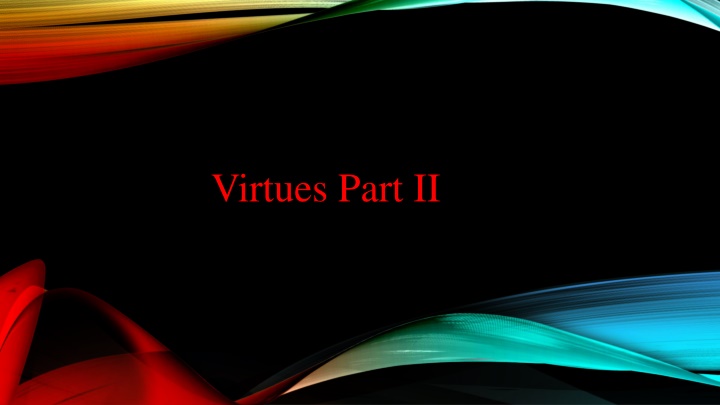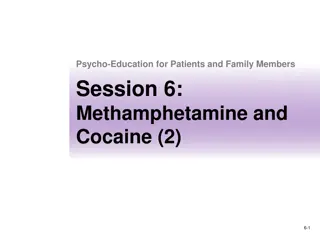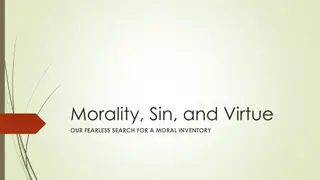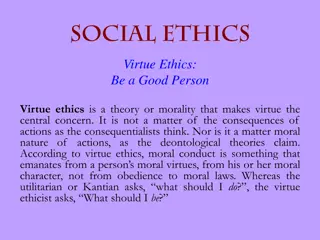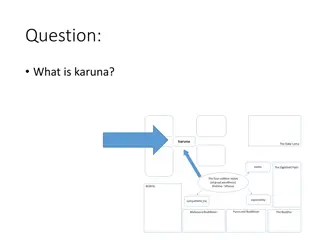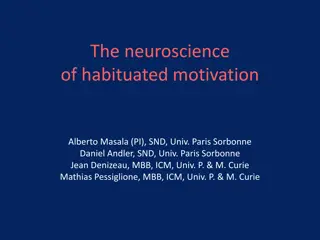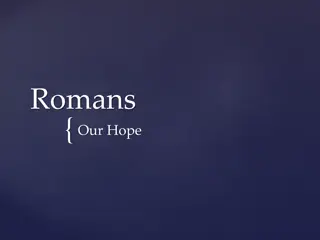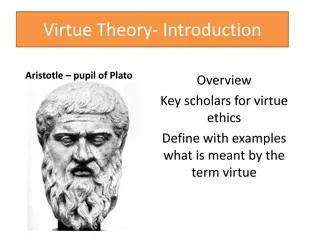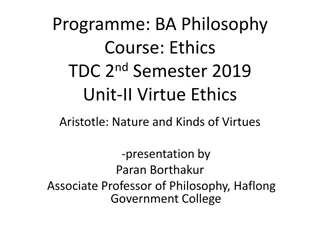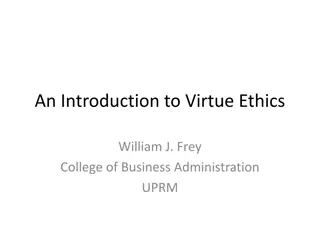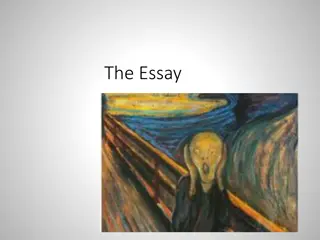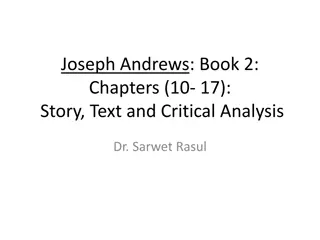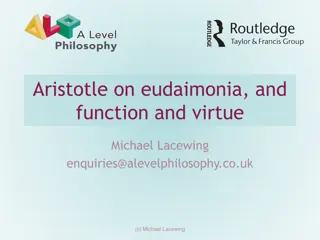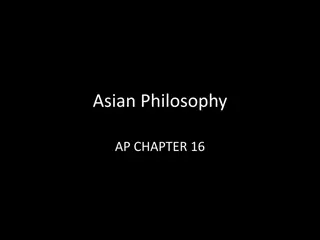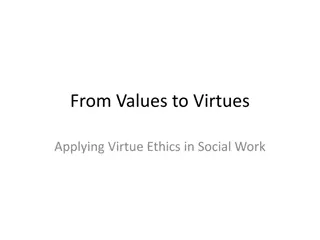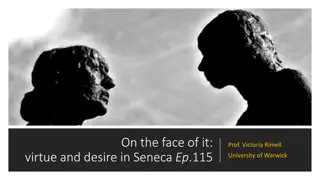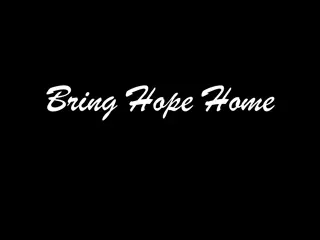The Virtue of Hope and the Dangers of Despondency
The concept of hope, intricately tied with faith, is explored alongside the perils of despondency in this insightful discourse. Hope is portrayed as a beacon of assurance and conviction in the unseen, while the absence of hope is likened to a spiritual ailment that renders the soul unresponsive to grace. Through poignant reflections and teachings from spiritual traditions, the narrative delves into the transformative power of hope and the destructive nature of despair.
Download Presentation

Please find below an Image/Link to download the presentation.
The content on the website is provided AS IS for your information and personal use only. It may not be sold, licensed, or shared on other websites without obtaining consent from the author.If you encounter any issues during the download, it is possible that the publisher has removed the file from their server.
You are allowed to download the files provided on this website for personal or commercial use, subject to the condition that they are used lawfully. All files are the property of their respective owners.
The content on the website is provided AS IS for your information and personal use only. It may not be sold, licensed, or shared on other websites without obtaining consent from the author.
E N D
Presentation Transcript
2. Hope The virtue of hope goes together with the power of faith. The patriarch Abraham in hope believed against hope that he should be the father of many nations (Rom 4.18). And hope, like faith, is in that which is not seen. For in this hope we are saved. Now hope that is seen is not hope. For who hopes for what he sees? But if we hope for what we do not see, we wait for it with patience. (Rom 8.24 25).
Hope is the assurance of the good outcome of our lives lived by faith in God. Hope is the power of certain conviction that the life built on faith will produce its fruits. Hope is the confidence that - despite all darkness and sin - the light of the loving forgiveness of God is upon us to do with us and for us what we ourselves cannot do. Our soul waits for the Lord; He is our help and shield. Yea our hearts are glad in Him, because we trust in His holy name. Let Thy steadfast love, O Lord be upon us, even as we hope in Thee (Ps 33.20 22).
The opposite of hope is despondency and despair. According to the spiritual tradition of the Church, the state of despondency and despair is the most grievous and horrible condition that a person can be in. It is the worst and most harmful of the sinful states possible for the soul. The loss of hope is the worst possible state because without hope, nothing else is possible; certainly not faith. St Jerome says, Among the fruits of the Spirit faith holds the seventh and sacred place, being elsewhere one of three faith, hope and love. 13 Nor is it remarkable that hope is not included in this catalog, since the object of hope is already included as a part of faith.
If a person is faithless, he can be chastised and convinced. If a person is proud, he can be humbled; If a person is impure, he can be cleansed; If a person is weak, he can be strengthened; If a person is wicked, he can be made righteous. But if a person is despondent and despairing (a person without hope), the very condition of his sickness is such that his heart and soul are deadand unresponsive to the grace of God
. . . the force of despondence . . . overwhelms him and oppresses his soul; and this is a taste of hell because it produces a thousand temptations: Confusion Irritation, Protesting and bewailing one s lot, Wrong thoughts, Wandering from place to place, and so on (Saint Isaac of Syria, 6th c., Directions on Spiritual Training).
The demon of despondency, which is called the noon-day demon (Ps 91.6) is more grievous than all others. . . . It arouses in him vexation against the place and mode of life itself and his work, adding that there is no more love among the brethren, and no one to comfort him. . . . Then it provokes in him a longing for other places . . .
The only remedy for despair is humility and patience, i. the steadfast holding to the life of faith, *even without conviction or feeling* iii. the simplification of life by going through each day - one day at a time - with the continual observances - however external - of scriptural reading, liturgical worship, fasting, prayer, and work. ii.
It is to remain stable in ones place, and to do what you are doing as well as you can, with all possible attention. It is to visit with spiritual friends, with those who are hopeful, merciful, joyful and strong. It is to stand fast to the end while passing through aridity and darkness, until the light of blessed hope and comfort are found. There is no other way, and those who find it are few (Mt 7.14). But when one fights and conquers against despondency and despair, this struggle is followed by a peaceful state and the soul becomes filled with ineffable joy
When we are attacked by the demon of despondency the most grievous of all, but who more than all makes the soul experienced , let us sow seeds of good hope in ourselves, singing with David the psalmist: Why are you cast down, O my soul, and why are you disquieted within me? Hope in God; for I will again praise Him, my help and my God
Sometimes people think that a certain lack of hope is a Christian virtue. They think that by proclaiming that all is lost they please God by their humility and sorrow over sins, their own and those of the world. They think that the more they concentrate on the evils of men, the more they exalt the strength of the wicked, the more they sigh and say, There is no help for us in God! , the more righteous and pious they become. But this is all wrong.
It has nothing to do with the patient suffering at the hands of the wicked, and the patient struggle against the powers of evil that the righteous must endure, being absolutely certain of their ultimate and total victory in God, the source of their strength and their hope. It is no virtue to feel weak and helpless in the presence of the wicked. It is no virtue to consider oneself totally at the mercy of evil and sin.
It is a virtue rather to be always .. rejoicing in hope, patient in tribulation knowing and believing that the final victory is God s (Rom 12.12).
